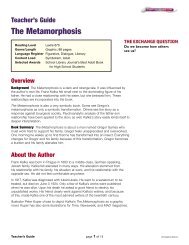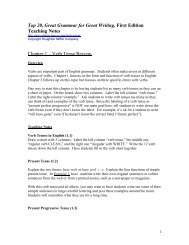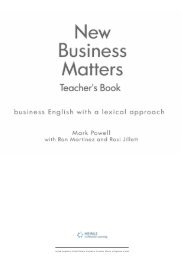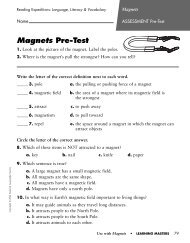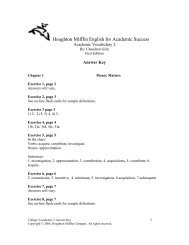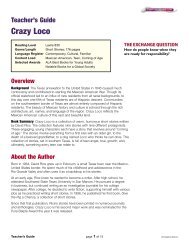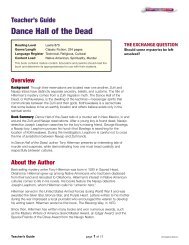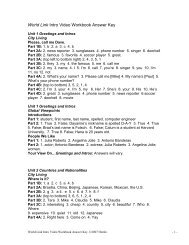English for Cabin Crew Trainer's Guide - Heinle
English for Cabin Crew Trainer's Guide - Heinle
English for Cabin Crew Trainer's Guide - Heinle
You also want an ePaper? Increase the reach of your titles
YUMPU automatically turns print PDFs into web optimized ePapers that Google loves.
UNIT<br />
4 Case study<br />
LEAD IN Speaking<br />
Write, I think airline food is ... on the board. Ask students to<br />
work in pairs and give them time to complete the sentence with<br />
their own thoughts. Then get feedback and discuss in open class.<br />
You could brainstorm positive and negative words used to<br />
describe food:<br />
+ delicious; tasty; fresh; tender; succulent<br />
– disgusting; tasteless; bland; dreadful<br />
EXERCISE 1 Reading<br />
Give students time to read the questions. Then ask them to read the<br />
text and make notes. Let students discuss the answers in pairs be<strong>for</strong>e<br />
discussing in open class.<br />
Answers<br />
1 Passengers = 1, 2, 3, 8, 9, 10<br />
<strong>Crew</strong> = 4,5,6<br />
Either = 7<br />
2 positive: 1, 3 and 10; negative: 2, 3, 7, 8 and 9 (3 contains both<br />
negative and positive comments); no opinion: 4, 5 and 6<br />
3 positive: fi ne, well prepared, look great, taste even better<br />
negative: the worst, bland, not very hot, badly presented, tasteless,<br />
dreadful, not fi t <strong>for</strong> human consumption<br />
EXERCISE 2 Speaking<br />
The aim here is to get students talking about their personal experiences.<br />
Give students time to read through the questions and think of responses.<br />
Ask them to discuss their responses in pairs or small groups. After a few<br />
minutes, get one student from each pair or group to briefl y summarize<br />
the main points of their discussion.<br />
Pre-teaching vocabulary<br />
Check the following key phrases: engage with passengers (talk to them);<br />
gauge passengers (work out what sort of person they are); get to know<br />
passengers (meet and become friends with them); appease passengers<br />
(say things to calm them down when they are angry).<br />
EXERCISE 3 and 4 Listening<br />
Give students time to read the situation and questions in exercise 3. Play<br />
the recording. Students listen, take notes and then discuss their answers<br />
in pairs. Get feedback in open class at the end.<br />
Follow the same procedure <strong>for</strong> exercise 4.<br />
Answers<br />
1 because she had the chance to engage with the passengers and get to<br />
know them<br />
2 during the pre-fl ight briefi ng; the number of meals and the nature of<br />
any special meals needed<br />
3 The woman’s children were given food from First and Business class.<br />
CD1 Track 4.9<br />
1 Did you enjoy this part of the fl ight?<br />
S: I enjoyed all parts of the in-fl ight service but the nicest part was probably<br />
doing the meals and the drinks because that was the chance you had to<br />
engage with the passengers <strong>for</strong> the fi rst time after take-off and you’d come<br />
through the cabin and you could really hold some good conversations with<br />
passengers and fi nd out, you know, how they were feeling, and you know, how<br />
excited, or, or if they wanted to be left alone and you could really gauge that<br />
quite well during that fi rst part of the meals or drinks service, and you could<br />
get to know people a little as well. You know, you’d get to know that little<br />
old lady who was very nervous about fl ying to Australia <strong>for</strong> the fi rst time and<br />
you’d also get to, you know, speak to a wide range of people <strong>for</strong>, you know, a<br />
duration, which was, which was good. During the food and drinks service quite<br />
often, particularly on international fl ights you’d have a lot of people on board<br />
who wouldn’t be able to speak the language, but there was never any problem<br />
with the food and drink. People all over the world seem to know what a coke<br />
is or whether they are having beef or chicken, so food and drink was never an<br />
issue with <strong>for</strong>eign language, which was always useful.<br />
2 How much do cabin crew know about the meals in advance?<br />
S: During the pre-fl ight briefi ng that all airlines carry out, the crew get to know<br />
about the meals in advance. We would know how many passengers we have on<br />
board – we would know any special meal requirements that are needed and any<br />
dietary problems and we would know of any special requests that a passenger<br />
may have given prior to their fl ight, so we have all that in<strong>for</strong>mation and by<br />
the time we get on board we check the catering to make sure those passenger<br />
requirements are actually on board.<br />
3 Do you remember one special incident during the meals service?<br />
S: During the meals service it can be horrifi c because although I’ve said that<br />
it’s a really great time to engage with customers, it’s also quite a frenetic<br />
time because passengers are also worried to know whether the meal they've<br />
requested is on board. One particular occasion I remember was a lady<br />
travelling from London to Hong Kong and she had three children and had<br />
requested three special children’s meals. Un<strong>for</strong>tunately, my stewardess had<br />
actually given the three children meals to the row in front of her, who just<br />
happened to have three children in the row in front, so of course the fi rst I<br />
heard of it was when the call bell rang and this very irate lady was so cross – I<br />
mean she was shouting and screaming at the stewardess at how stupid the<br />
stewardess had been and why should these other people get her children’s<br />
meals that she had requested. It was a diffi cult situation but I managed to<br />
calm her down by listening to her and sorting out the children with food from<br />
Business class and First class which was very <strong>for</strong>tunate because this particular<br />
fl ight we had a lot of children and a lot of children’s meals and there weren’t<br />
any spare, so the only way I was able to appease this lady was to go and make<br />
up a dinner from the First class menu and <strong>for</strong>tunately managed to do that. But<br />
yes, it was an occasion I remember well.<br />
EXERCISE 5 Speaking<br />
Ask students to discuss the questions in pairs or small groups. Get<br />
feedback in open class and encourage students with interesting ideas<br />
to share with the class.<br />
ROUND UP<br />
Revise vocabulary from the unit by asking students to write<br />
words and phrases connected with food and drinks under the<br />
following headings:<br />
Breakfast / Drinks / Fruit and vegetables / Food adjectives /<br />
Duty-free goods<br />
Ask students to work in pairs to write all the words and phrases<br />
they know, or to search the unit to fi nd words and phrases to<br />
write.<br />
19



